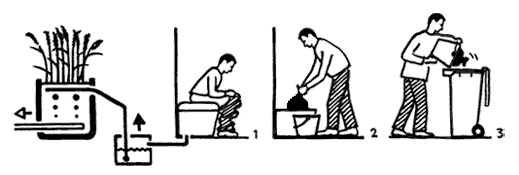Saving potable water and the purification of waste water
The Nonolet
A conventional toilet uses a minimum of 8 liters of potable water per flush. The Nonolet as developed by us uses no flush water at all because nothing is flushed away. In addition to the enormous amount of water saved this way, this also implies that a connection to the sewage system isn't necessary. Only the urine needs to be collected and disposed of. This means the Nonolet can be placed anywhere. Used on a large scale this would take the pressure of off ever expanding, very expensive sewage systems.

This toilet is odorless, hygienic and it is absolutely quite (a big bonus when used in recreational boats or any small living unit for that matter). The dry, odorless content is collected in a degradable bag and can either be thrown away in the garbage bin (preferably garden waste bin if collected separately) or used to your own benefit on your compost heap*. When used for the compost heap the degradable bag needs to be removed. The Nonolet uses the unique paper-covering principle (the secret behind the lack of odor).
*Keep in mind that it will take 1½ years to compost properly. See our article on composting for extra information.
The capacity of the collection tank lined with the degradable bag (40 to 60 times full use, depending on model, without changing bags or using chemicals) and the use solely of recycled paper tissue, makes the use of the Nononlet an environ friendly and very cheap alternative in comparison to the common toilet. On average a household consisting of four people will spend no more than 20 to 30 euros on tissue and degradable bags per year. In addition to this you save up to 40% on your annual household usage of water.
Compost factories are more than happy with this enriched garden waste. As processed by Orgaworld in Lelystad, Holland it can even be turned into natural energy. Orgaworld also has possibilities for processing urine. An advantage if the urine is collected and processed separately is that all medicine residues can be intercepted before they reach the open water.
Our toilet waste becomes a valuable product this way and instead of being a burden to the ecological system it helps to keep it in balance.
